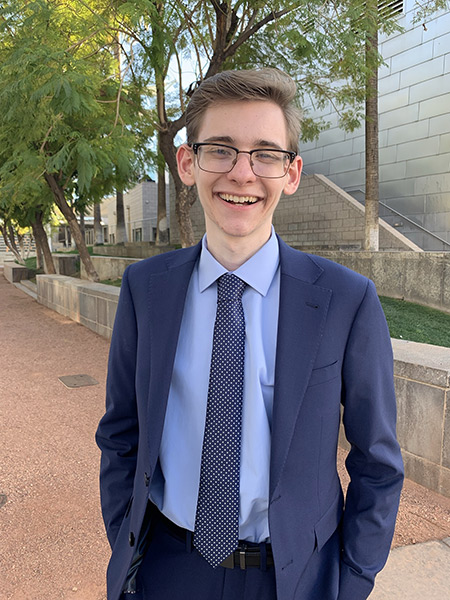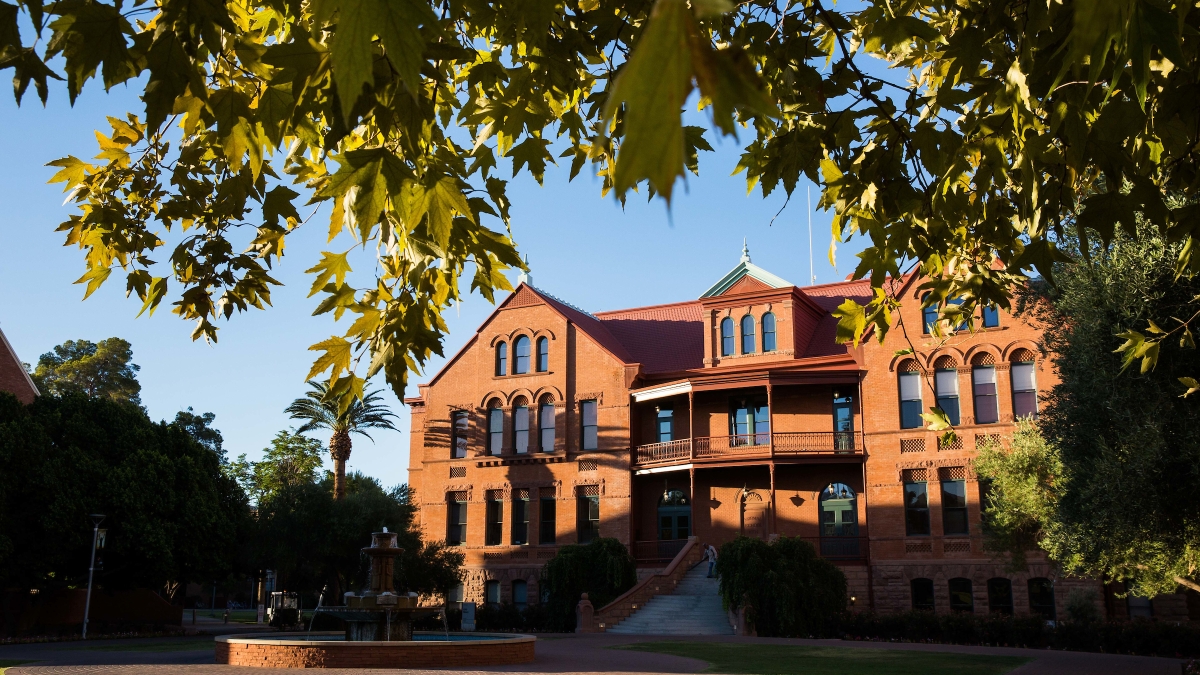Editor’s note: This story is featured in the 2022 year in review.
Arizona State University senior Nathaniel Ross has been awarded the coveted Rhodes Scholarship to pursue postgraduate studies at the University of Oxford, the American Secretary of the Rhodes Trust recently announced.
Ross is one of only 32 American Rhodes recipients for the 2023 application cycle and one of only three students representing public universities. He is the first ASU student awarded an AmericanTwo ASU candidates in recent years were awarded Rhodes Scholarships in the Zimbabwean constituency. Rhodes Scholarship in more than 20 years.

ASU senior Nathaniel Ross has been awarded the Rhodes Scholarship for postgraduate studies at the University of Oxford in the United Kingdom.
“I am incredibly grateful to have been selected,” Ross said. “The finalists in my district were all so incredibly kind and impressive in their own right. Being selected among them was an absolute honor. I am beyond excited to be part of the Rhodes community and study at Oxford next year.”
Rhodes Scholarships provide all expenses for two or three years of postgraduate study at the University of Oxford. It is the oldest international postgraduate award in existence, and many consider it to be among the most prestigious. The scholarships were created in 1902 by the will of mining magnate Cecil Rhodes and are now supported by a cohort of philanthropies and benefactors.
At Oxford, Ross will study comparative social policy, after which he will attend law school and specialize in disability law. His long-term objective is to shape disability policy as an attorney-advisor for a national disability advocacy organization, federal agency or global non-governmental organization.
“Arizona State University empowers elite scholars who want to have a meaningful social impact,” ASU President Michael M. Crow said. “Nathaniel Ross is a uniquely gifted thinker capable of simultaneously synthesizing ideas across diverse subjects and applying his knowledge to improve the lives of others. As such, Nathaniel embodies our highest aspirations as a national service university.”
Ross acknowledges the role his time at ASU has played in his success.
“I don't believe there is a single Rhodes scholar that accomplished the feat without a community of support, and I am no exception,” he said.
Ross also acknowledges the immense opportunity the Rhodes Scholarship presents.
“As part of the Rhodes community, I know I can have an even greater impact on the issues I care about," he said. "The fraction of Rhodes scholars who are disabled, attend a state school or are first-generation university students is rather small. After my selection, I hope to encourage other people from similar backgrounds to apply for nationally competitive scholarships.”
The application process for the Rhodes Scholarship is arduous, and competition is intense. In his will, Cecil Rhodes stipulated several criteria for the selection of scholars, most of which are still applied today.
“The first and most obvious criterion is ‘scholarly attainment,’” said Kyle Mox, associate dean for national scholarships and ASU representative for the Rhodes Scholarship. “To be competitive, an applicant must have posted near-perfect grades while completing an exceptionally challenging curriculum.”
Ross clearly fits the bill. In 2019, he was selected as a Flinn Scholar, and he will graduate ASU with honors from Barrett, The Honors College in December with bachelor’s degrees in biological sciences, political science, applied quantitative science and history. In May 2023, he will receive a Master of Science in biology and society. To date, he has achieved no grade lower than an A in any course.
But, per Rhodes’s stipulations, Rhodes Scholars are not “mere bookworms” — they must also demonstrate devotion to enacting lasting social impact and be committed to making a strong difference for good in the world.
“We often refer to this quality as ‘fighting the world’s fight,’” Mox said, adding that, “Rhodes Scholars must show extraordinary leadership potential.”
Ross’s achievements in civic engagement and as an activist have already been well recognized. In 2021, he was selected as a Udall Scholar for his commitment to environmental and disability activism, and in spring 2022, he was selected as the national finalist for the Truman Scholarship in recognition of his devotion to public service.
As a committed disability rights activist, Ross founded EosFighter Connection, a nationwide support network for youth who suffer from eosinophilic and other disorders. He also is politically active, having interned with progressive lobbying firm Creosote Partners. Recently, he launched a bid for a seat on the Mesa City Council and became the youngest candidate to ever make the ballot, falling just 200 votes shy of qualifying for the general election.
Rhodes Scholars are chosen in a two-stage process. First, applicants must be endorsed by their college or university. For the 2023 cycle, the applications of six ASU students and recent graduates were endorsed by a faculty committee on the basis of their academic records, leadership and service activities, previous awards and honors, and letters of recommendation.
Nationally, more than 2,500 students began the application process. Of that number, 840 were endorsed by 244 different colleges and universities. Selection committees in 16 districts then invite the strongest applicants to appear before them for interview. Each district interviews at least 14 finalists over the course of two days. Once again, this year, the interviews were conducted virtually. At the conclusion of the interviews, each district immediately announces two recipients.
Ross said the announcement of his selection came as a shock.
“I honestly was not sure if I heard my name correctly. I kept waiting for the selection committee to say my name again in order to confirm I really was a winner,” he said. “Even days later, I don't think I have even begun to process what this means for my future. All I could think about was the years of work that went into this moment. Although applications only opened up this summer, the process of becoming a Rhodes Scholar often begins during freshman year or even earlier.”
Initially offered only to male applicants from British Commonwealth countries, the program has become far more inclusive over the years, first admitting women in 1977. In recent years, the number of scholarships awarded globally has risen to more than 100 and now includes more than 20 different constituencies that encompass 64 countries, including Australia, Canada, China, Germany, Israel and in Southern Africa. In recent years, two ASU candidates were awarded Rhodes Scholarships in the Zimbabwean constituency: Ngoni Mugwisi in 2017 and Shantel Marekera in 2019.
The largest single constituency is the United States, which is allotted 32 scholarships per year. Historically, the bulk of Rhodes Scholarships are awarded to highly selective private institutions: In the 2023 cycle, six graduates of Harvard and five graduates of Yale received Rhodes Scholarships, and 19 of the 32 awards were netted by either Ivy League universities or U.S. service academies.
The value of the Rhodes Scholarship varies depending on the academic field and the degree. The Rhodes Trust pays all college and university fees, provides a stipend to cover necessary expenses while in residence in Oxford as well as during vacations, and transportation to and from England. The total value of the Scholarship averages approximately $75,000 per year.
Now that the process is finished, Ross will begin planning for his journey to England and his studies at Oxford.
“I have never been to the U.K., and now I will spend the next two to three years of my life studying at the top university in the world. For the first time in my life, moving to another country is a reality for me. I have realized that this homegrown East Valley boy is going to have to buy his first real winter coat to survive the U.K. winters!”
Since the inception of the Rhodes Scholarship in 1904, six ASU graduates have been awarded the American Rhodes, with the most recent being music education major Philip Mann in 2001. Mann went on to study and teach music at Oxford and won the annual competition to become principal conductor of the Oxford University Philharmonia. In 2010, he was named music director and conductor of the Arkansas Symphony Orchestra, and in April 2022, joined the faculty of the University of Maryland-Baltimore County as an assistant professor of music and conductor of the UMBC Symphony.
The American Rhodes Scholarship is available to U.S. citizens between the ages of 18 and 24. Current ASU students or recent graduates who wish to be nominated by ASU should contact the Lorraine W. Frank Office of National Scholarships Advisement.
Story submitted by the Lorraine W. Frank Office of National Scholarships Advisement.
More University news

ASU community exceeds goal, raises $835K for Valley of the Sun United Way
The Arizona State University community stepped up and raised over $835,266 for the Valley of the Sun United Way — exceeding the $800,000 goal for 2024.Of the total, $802,192.17 was raised through…

ASU launches online ocean futures undergraduate degrees
Our oceans make up three quarters of the planet’s surface and contain most of its biodiversity. Due to rapid and global changes, they are endangered — making more urgent a deeper knowledge of ocean…

ASU public affairs graduate programs rise to No. 11 in nation in US News & World Report’s 2025 rankings
Arizona State University rose to No. 11 nationwide for best graduate public affairs programs in U.S. News & World Report’s 2025 rankings, the magazine announced.The ranking, released April 8,…


